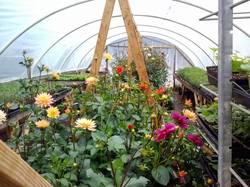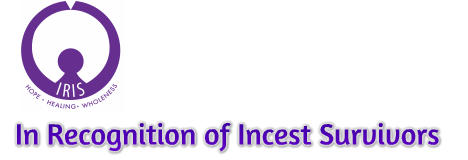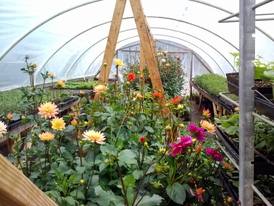I first met Pamela when she asked me if she could quote part of our website in her book.

We quickly found that we have much in common, especially our strong need to be heard and our passion for encouraging others to heal. I am happy to include our interview with her, below, on our site. Pamela would like to send a free copy of her book to the first person to comment on this post, so, feel free to hit the "comment" button, above, and let us know what you think! My family is lined up to read my copy, and I recommend it to you, as well. Life Soup is a self-published work that may be ordered in print or downloaded to Kindle at Amazon.com.
One more note, that I include here because of my own philosophy on faith and healing. Those who read Life Soup will encounter Pamela France's strong Christian faith and her love of Jesus, which helped to sustain and heal her. As recovering people we acknowledge that part of the damage from childhood sexual abuse is spiritual, and therefore requires a spiritual response and spiritual healing. Jesus is Pamela's walk, but there are many paths to spiritual healing - which one is yours?
A Conversation with the Author of Life Soup - A Memoir: Testifying to the Healing Power of Jesus Christ:
IRIS: Why did you wait so long to write your book?
PLF: The healing process follows its own course. It takes years to understand oneself and when abuse is thrown into the mix, it can take even longer. I have been writing all my life and I found it very beneficial to get my thoughts and feelings out in this way. I wanted to share my testimony of Jesus Christ. My hope is that it might touch the hearts of those caught in the throes of traumatic abuse. Conveying this in a readable and inoffensive way took time.
IRIS: What is your background that allows you to offer credibility to other people?
PLF: I survived my father's abuse. Throughout my life I have taken many opportunities to read, study and experience what I could that would help me to deal with its effects. Along the way, I learned much and wanted to help other in similar circumstances.
IRIS: Where did you acquire your love of writing and your desire to write? You have a gift for storytelling that elevates memoir, which is a difficult genre.
PLF: I must admit that reading and writing in my teen years became an escape. Reading, especially, took me away to other places and helped keep my mind off my troubles. I love most genres of literature and have immersed myself in everything I read. My favorite categories are mystery and historical fiction. I believe writing is a wonderful way to heal wounds of the heart.
IRIS: We know that incest is a terribly squeamish subject for most people, and often those of us who speak out about it are vilified by readers who feel offended by the subject. What gave you the confidence to write a book on this controversial topic?
PLF: Frankly, my confidence was in the Lord. I hope that writing Life Soup helps repay some of the debt for the blessings He provides in such abundance. Sharing my story was not easy for me. Fortunately, I have a very loving family and friends who care. These people encouraged me to continue. I believe I had more determination and hope than confidence. Mia Angelo's quote says it well - "There is no greater agony than bearing an untold story inside you."
IRIS: Yes, but telling the story is difficult and fraught with danger! Sometimes we have to wait until the pain of bearing the untold story overbalances our trepidation. Did you worry about those in your book whose names you included?
PLF: When I shared my manuscript with my beta-readers, I ask if I should use real names or fictional. My sister, Paula, a major character in my childhood and healing journey, said, "We are who we are." I am so appreciative of her attitude and support. My topic is sensitive, but it is my story to tell.
IRIS: Who has this book benefited and why?
PLF: Since writing this book, I have been surprised at the unexpected benefits. One friend shared a wish that she could have read it many years ago. She felt it would have helped her better understand and love her own mother, who was also a victim of incest. Many have told me that they shared the book with a friends dealing with similar circumstances such as: the mother of a child victimized, a woman dealing with effects of abuse perpetrated on her during childhood and now trying to raise her own children. Other victims also shared support and appreciation that I had a voice when they had none. Abuse can make one feel so isolated. I needed to tell my story to let others know that they are not alone and that someone cares and understands.
IRIS: Thank you for mentioning our website in Life Soup. I am interested to know if you found one of the 10 Rights in the Incest Survivor's Bill of Rights particularly helpful, or new or surprising to you, and why?
PLF: Number three: "We have the right to be believed" was significant for me. I carefully chose those individuals I disclosed to, just as it said, and it made the world of difference. Each time I shared my story, I received validation from those who believed and subsequently I found more peace. My book has been received by my sisters and family with love and, surprisingly, with overwhelming acceptance. This Right gave me courage to tell my story. I share a moment in time in my book where I began to tell a teacher about the horrors at home. I believe she did believe me, but she said, "We shouldn't talk about such things." That's not the move I wish she had made. This right gives excellent sound advice as to what must be done. Belief comes first and then proper action follows.
In addition, "Number six: We have the right to heal" has amazing insights into the healing process. I made a poster out of these main things found in #6 and still read it daily. Two main things that deeply impacted my thinking are here in bold:
- Healing is a process and a conscious decision.
- We begin to heal when we are ready – this does not mean giving up any of our feelings of anger or grief, or that we must forgive anyone whom we do not wish to forgive.
- Healing is a highly personal process – we must find our own definition of healing and find the tools for healing that are helpful and meaningful to us.
- Treating ourselves kindly as we heal is a powerful lesson to ourselves about our own
self-worth. - We should never be afraid to ask for the help we need from health professionals, but we must remain in charge of our needs and never abdicate our own judgment about our well-being to someone else.
- When we stop seeing ourselves as victims, the abuse finally stops – forever.
- Nothing about healing goes in a straight line, but the arc trends upward.
- We might never be all the way healed, but we can be extremely well at the same time that we live with these wounds.
- Incest is something that happened to you – it is not who you are.
- Be prepared to end up in places you never expected – with ideas you never knew you would have and with happiness greater than you ever dared to feel you deserve.
- Let the good times be good.
IRIS: Thank you so much for this, Pamela, and for all the work and love that went into your book. We hope you have many, many good times come to you!


